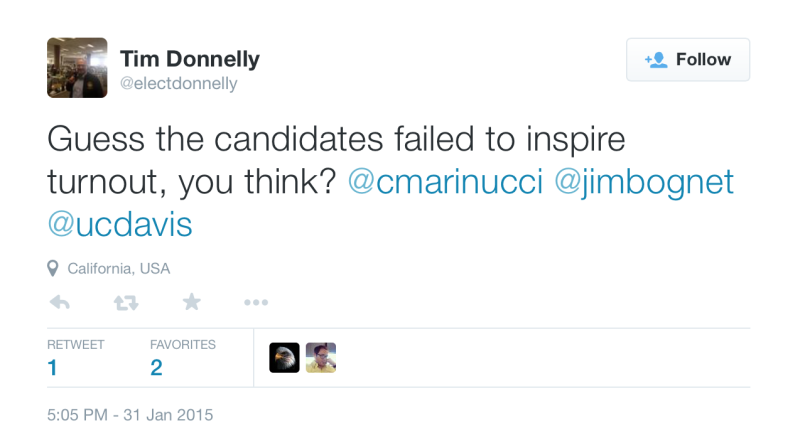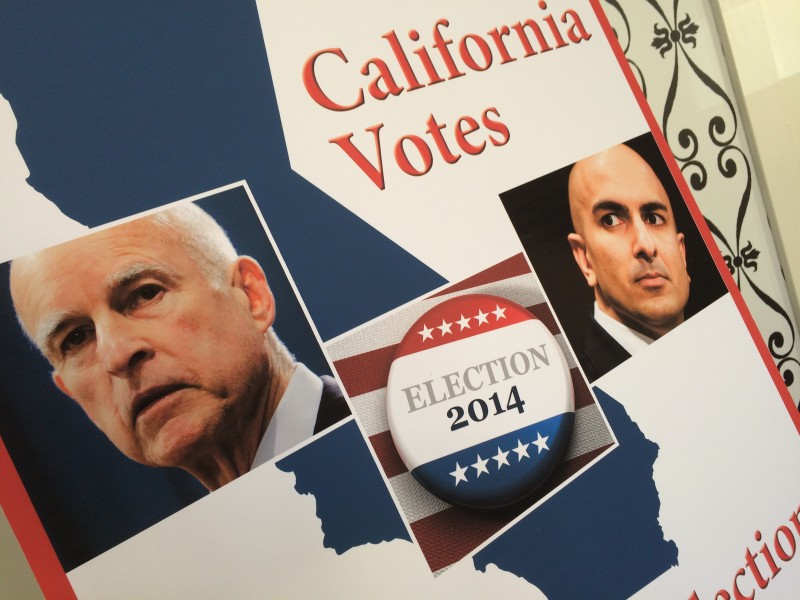The 2014 race was, to hear the top strategists describe it, a battle of "authenticity," even though some in the audience suggested it was a bit ... well, boring.
Not so, said Democratic strategist Ace Smith, a longtime adviser to Brown and a key architect of the victory over Kashkari on Nov. 4. Smith argued that the governor's strategy was a campaign based not on himself but on things that mattered: things like California's water needs and its long-term budget stability, embodied in the top two measures on the ballot and around which Brown shaped his only TV ads and stump speeches.
"Instead of doing the standard thing," said Smith, "how about running an election based on the voters?"
The idea of issues and policies driving the campaign was the Brown strategy for a long time, said Dana Williamson, the governor's cabinet secretary. She said the fact that the veteran Democrat convincingly won a fourth term "didn't happen by accident."
Among the things Williamson told conference attendees that laid the groundwork for success: the 2010 constitutional change that allowed Democrats to pass a state budget on their own (and the governor's subsequent 2011 veto of a budget); Brown's close working relationship with the traditional GOP-allied business community; and key legislative victories for Latino groups focused on outreach to undocumented immigrants.
"There was four years of a lot of things that happened that led up to a 'non-campaign,' " said Williamson.
Kashkari's Big Win Was Getting Past His Rival
Republican strategists at the Berkeley conference made it clear that the real battle for their candidate was the race that ended on June 6: the primary election in which Neel Kashkari edged out GOP rival Tim Donnelly for the right to challenge Brown in the fall.
Donnelly, at the time a state assemblyman from San Bernardino County, is ideologically far to the right of the more moderate Kashkari.
"I thought there was a lot at stake for the party," said GOP strategist Kevin Spillane, who helped lead an independent expenditure effort against Donnelly and thus to boost Kashkari.
By the time the primary election rolled around, a number of prominent mainstream Republicans -- from Jeb Bush to Condoleezza Rice and former Gov. Pete Wilson -- all had publicly endorsed the newcomer whose government resume included only his time as an assistant U.S. Treasury secretary crafting the bank bailout of 2008.
Spillane recounted a conversation with a top California Republican who he declined to name, who said a Donnelly victory on June 6 would have decimated the state GOP's chance to ever mount a comeback from its now decade-plus long decline in California.
"If we didn't succeed," Spillane recounted the Republican VIP saying, "it's turn out the lights and shut the doors, the donors were gone, they were going to give up [on the party], they were going to walk away."
The anti-Donnelly effort wasn't well funded, though. Kashkari still came out on top, said Spillane, because the record low turnout election in June increased the value of even small bits of information that GOP voters were able to glean about Kashkari -- namely, those endorsements.
Donnelly, who organizers say was invited but declined to attend the post-election conference, offered his own take in a single tweet posted on Saturday afternoon.

The 'Authentic' Candidates
Inspirational or not, advisers for both Brown and Kashkari argued during the two-hour Q&A that their candidates were the antithesis of modern campaigns shaped by stagecraft and political optics.
"The cornerstone was authenticity," said adviser Aaron McLear on Neel Kashkari's mandate to his campaign team. McLear said that the GOP candidate didn't want to repeat what, in his opinion, was the fatal flaw in the 2010 candidacy for governor of Meg Whitman or the 2012 presidential campaign of Mitt Romney.
"They didn't come across as sincere and genuine," said McLear.
That included Kashkari's interest in issues that weren't staples of traditional Republican campaigns, like poverty. Kashkari gained a bit of short-lived traction on the issue last summer, when the campaign's video of the candidate posing as a homeless man on the streets of Fresno went viral.
But Brown's team said the video, plus Kashkari's 11th-hour TV ad on teacher tenure that featured a young boy drowning in a swimming pool, undercut that notion of being authentic.
On the drowning-kid ad, adviser McLear said that Kashkari wanted something that "shocked people, pissed people off."
Brown adviser Ace Smith countered that the ad did nothing to help, and may have hurt, a broader public debate about the quality of education and good teachers.
"It's made a serious issue trivial," said Smith.
The Writing Was On The Wall...?
None were surprised, though, by the bottom line: Jerry Brown winning an unprecedented fourth term as governor -- which may be why political advisers to Brown's rival advised their candidate not to spend his own money on the race. All told, Kashkari spent about $3 million of money he made in his time both at Goldman Sachs and at PIMCO, a Newport Beach investment firm.
McLear told conference attendees that the last $1 million Kashkari put into the campaign on Oct. 17, was because he believed he would regret not doing everything he could do to be competitive ... even if he was going to lose.
Big GOP contributors, though, were not as motivated. Campaign records show Kashkari only raised about $700,000 after the June 6 primary.
"The donors just walked away from him," said strategist Spillane.
Kashkari, who tweeted on Friday that he was in the Philippines, has been laying low since Election Day. His top strategist says there's a good reason why.


